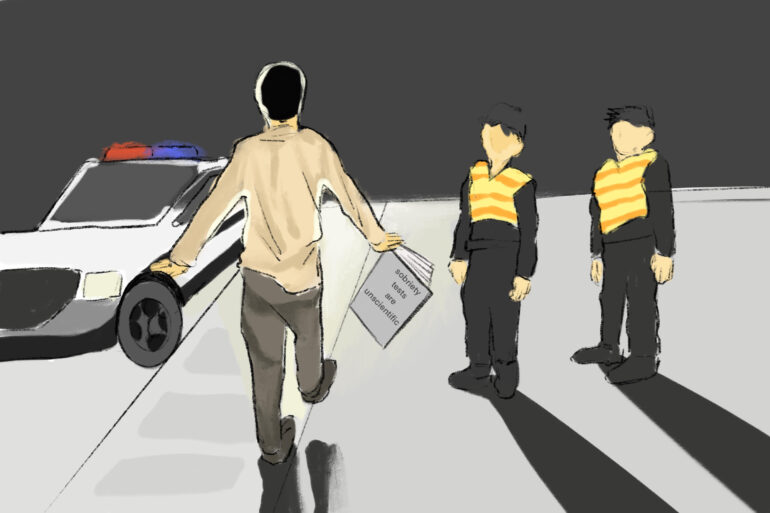When someone gets pulled over on suspicion of drinking and driving, law enforcement officers have a series of tests they typically perform in order to confirm whether or not the individual behind the wheel is, in fact, under the influence. And while these tests might perform well in a laboratory under perfect conditions, they aren’t always reliable in the field. In fact, studies and real-world cases have shown that field sobriety tests are often wrong — leading to unfair arrests and legal battles you never should have faced.
Understanding why these tests fail, and what it means for your rights, is key if you ever find yourself in that situation.
What Field Sobriety Tests Are Supposed to Do
Field sobriety tests are designed to measure coordination, balance, attention, and reaction time. Officers use them to decide whether there’s probable cause to arrest someone for driving under the influence. The three “standardized” tests recognized by the National Highway Traffic Safety Administration (NHTSA) are:
- Horizontal Gaze Nystagmus (HGN) Test: In this test, the officer holds a pen, small flashlight, or similar object about a foot from your eyes and slowly moves it from side to side. They are looking for tiny, involuntary jerks in your eye movements, which can be more pronounced when alcohol or drugs are in your system.
- Walk-and-Turn Test: The walk-and-turn is meant to measure balance and the ability to follow instructions at the same time. You’re asked to take nine heel-to-toe steps along a straight line, pivot carefully, and return the same way.
- One-Leg Stand Test: Here, you’re told to stand on one leg while lifting the other about six inches off the ground and counting aloud until the officer tells you to stop. The test usually lasts 30 seconds, which can feel much longer when you’re anxious and under pressure.
On paper, these tests seem simple. In reality, they are far from perfect and fairly prone to error.
Why Field Sobriety Tests Are Wrong So Often
The accuracy of field sobriety tests depends on more than your sobriety. Countless external factors can cause someone to “fail,” even if they haven’t had a drop of alcohol.
For example, poor weather, uneven ground, flashing lights from patrol cars, or even the shoes you’re wearing can all affect performance. Add to that the natural stress of being stopped by police, and it’s easy to see how mistakes happen.
Medical conditions and age are another issue. People with inner ear problems, back pain, or neurological conditions often struggle with balance. Older adults may also find it harder to perform these physical tasks, which has nothing to do with alcohol or drugs. The list goes on.
Even officers themselves can introduce errors. If they don’t administer the test exactly as trained, the results are compromised. Unfortunately, courts often rely heavily on an officer’s subjective interpretation, making these tests even more problematic.
The Numbers Behind the Inaccuracy
Research has repeatedly shown that field sobriety tests aren’t foolproof. According to studies sponsored by the NHTSA, the Horizontal Gaze Nystagmus test is about 77 percent accurate, the Walk-and-Turn about 68 percent, and the One-Leg Stand about 65 percent. That means in roughly one out of three cases, these tests give the wrong result.
Think about that. If you take a test designed to determine whether you go home or end up in handcuffs, and it’s wrong 30 percent of the time, that’s not exactly reassuring.
How Inaccuracy Impacts You
When a field sobriety test is wrong, the consequences are serious. You could be arrested, handcuffed, and booked — all while completely sober. Even if later evidence shows you weren’t intoxicated, the arrest itself can damage your reputation, cost you time and money, and leave a lasting mark on your life.
This is where having strong legal representation becomes critical. As Ryan Beasley Law explains, “There is no substitute for having an advocate on your side who is ready to take effective action on your behalf.” If you’re accused of DUI because of a flawed test, you need someone who understands the weaknesses in the system and knows how to challenge the evidence against you.
Attorneys with DUI defense experience know how to expose the flaws in field sobriety evidence. They may question whether the officer was properly trained, whether the test was conducted under fair conditions, or whether your medical history could explain the results. They can also do things like highlight the known error rates of these tests, showing the court that the evidence is far from conclusive.
What You Can Do If You’re Stopped
If you ever find yourself facing a field sobriety test, remember that you have rights. While laws vary by state, you’re not always required to perform these roadside exercises. Refusing might carry consequences, such as a license suspension, but performing the tests can also give officers evidence to use against you. It’s a catch-22.
The safest thing is to remain calm, polite, and aware of your options. If you are arrested, don’t argue your case on the roadside. Instead, focus on protecting yourself legally once you’re out of custody.
Adding it All Up
By now, you should know that field sobriety tests are anything but perfect. So, if you ever find yourself in a position like this, remember that you don’t have to (nor should you) do it alone. The best thing you can do is hire an attorney to fight on your behalf so you have every chance to be treated fairly and justly.






